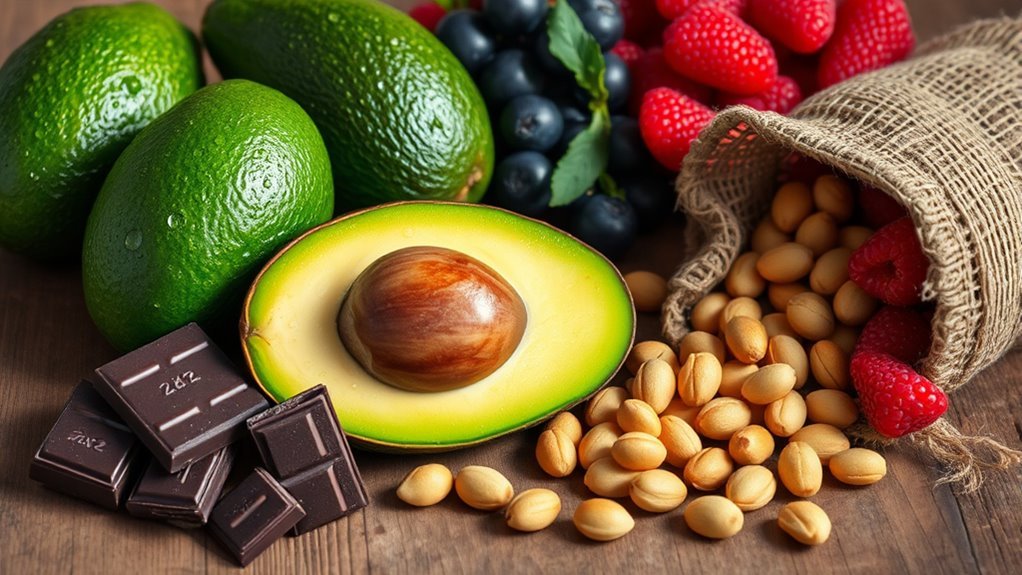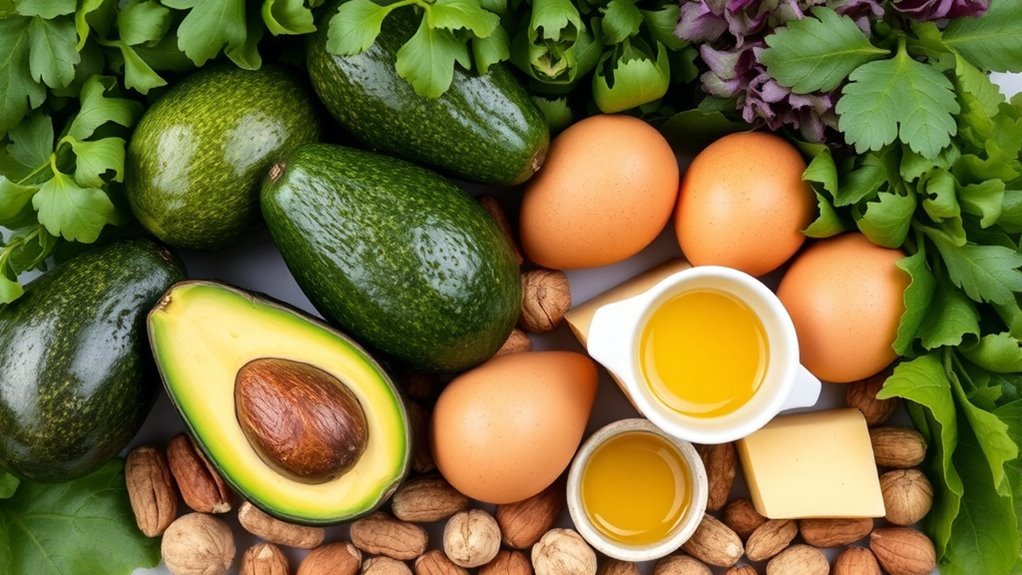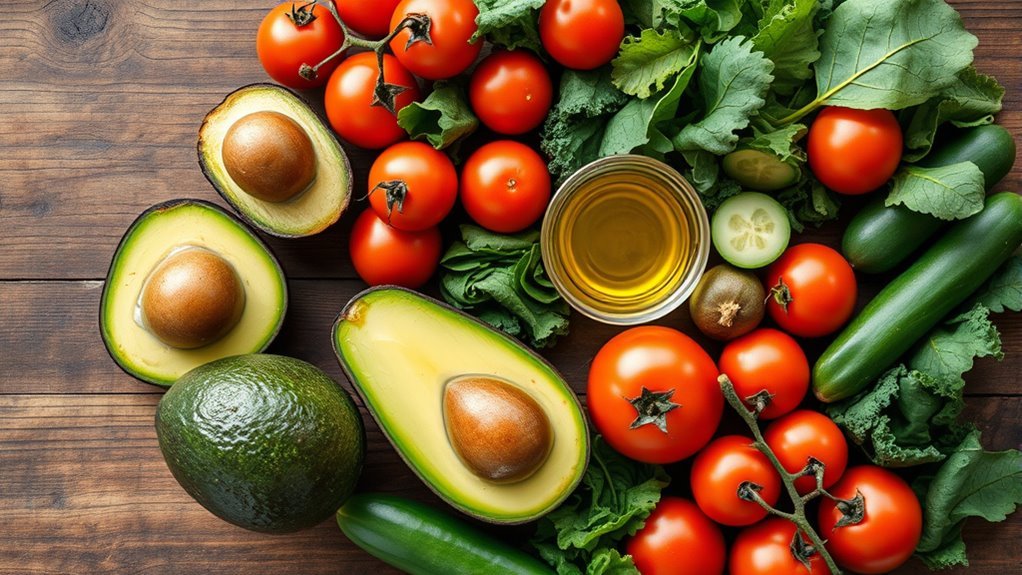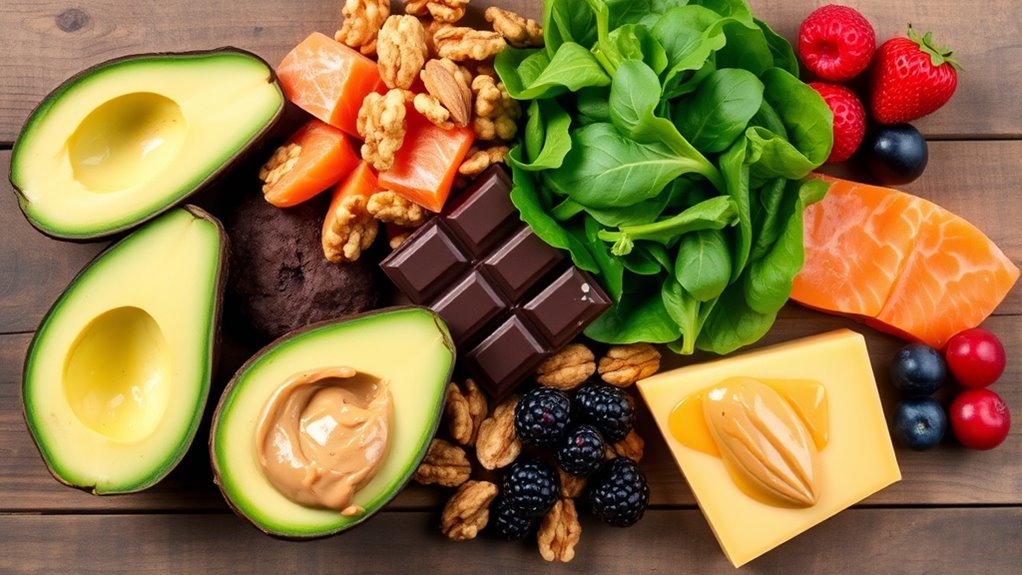The top keto foods you should consider include avocados, eggs, leafy greens, nuts, seeds, and fatty fish. These options are nutrient-dense and low in carbs, perfect for supporting a keto lifestyle. Olive oil and coconut oil are excellent for enhancing flavors while offering health benefits. Don’t forget berries, which provide antioxidants with low carbs. Including meat and poultry guarantees you get essential protein and healthy fats. There’s a lot more to explore about these foods!
Avocados

Avocados are a powerhouse of nutrients that fit perfectly into a keto diet. They’re low in carbs and high in healthy fats, making them ideal for keeping your energy levels stable while promoting ketosis. The avocado benefits include a rich supply of vitamins, minerals, and antioxidants that support overall health. Plus, they’re incredibly versatile—you can whip up delicious avocado recipes like guacamole, salads, or even smoothies that satiate your hunger and satisfy your taste buds. Incorporating avocados into your meals not only enhances flavor but also boosts your nutrient intake without kicking you out of ketosis. So, whether you’re looking for a quick snack or a hearty dish, avocados are your go-to ingredient for a successful keto lifestyle.
Eggs

Eggs are one of the most versatile and nutrient-dense foods you can include in your keto diet. With various egg varieties like chicken, duck, and quail, you can add unique flavors and textures to your meals. Plus, they’re low in carbs and high in protein, making them perfect for keto.
Here’s a quick look at some popular cooking techniques for eggs:
| Cooking Technique | Description |
|---|---|
| Boiling | Cooked in water, easy to peel. |
| Scrambling | Whisked and cooked in a pan. |
| Poaching | Cooked in simmering water. |
| Frying | Cooked in oil or butter. |
Incorporating eggs into your diet not only keeps your meals interesting but also boosts your nutritional intake!
Leafy Greens

When you’re following a keto diet, incorporating leafy greens can greatly enhance your meals while keeping your carb intake low. These vegetables are rich in nutrient density, providing essential vitamins and minerals without compromising your dietary goals. You can easily add them to your daily routine through simple salad recipes or as a side dish.
Consider these leafy greens for a keto-friendly menu:
- Spinach: Packed with iron and calcium, it’s versatile for salads or smoothies.
- Kale: High in antioxidants, it’s great for sautéing or adding to soups.
- Swiss Chard: Loaded with vitamins A and K, it complements any dish.
Embracing leafy greens not only supports your health but also keeps your meals exciting and flavorful.
Nuts and Seeds
Incorporating nuts and seeds into your keto diet can provide a satisfying crunch while boosting your intake of healthy fats, protein, and fiber. Nut varieties like almonds, walnuts, and macadamias are low in carbs and high in nutrients, making them ideal for keto. They’re packed with antioxidants and healthy omega-3 fatty acids, which support heart health and reduce inflammation. Similarly, seeds like chia, flax, and pumpkin offer impressive seed benefits, including high fiber content and essential minerals. They can help keep you feeling full and satisfied while contributing to your overall nutrient profile. So, grab a handful of your favorite nuts or sprinkle some seeds on your meals to enhance flavor and nutrition on your keto journey!
Fatty Fish
Fatty fish are a fantastic source of omega-3 fatty acids, which can support heart health and reduce inflammation. When choosing the best types, salmon, mackerel, and sardines stand out for their nutrient density. You’ll also want to take into account cooking methods like grilling or baking to maximize their health benefits while keeping your keto diet on track.
Health Benefits of Fish
While you might be familiar with various health benefits of fish, fatty fish like salmon, mackerel, and sardines stand out due to their rich omega-3 fatty acid content. These fish types offer compelling advantages that can enhance your well-being.
- Heart Health: Omega-3s help lower blood pressure and reduce triglycerides, promoting cardiovascular health.
- Brain Function: Regular consumption may improve cognitive function and lower the risk of neurodegenerative diseases.
- Anti-Inflammatory Properties: Omega-3s can reduce inflammation, potentially alleviating chronic conditions.
Including fatty fish in your diet can provide essential nutrients and support overall health, making it a valuable addition to your keto lifestyle. Embrace the freedom of making informed choices for your nutrition!
Best Types to Choose
When selecting fish to enhance your keto diet, focusing on the right types of fatty fish is key. Opt for salmon, mackerel, sardines, and trout, as they’re rich in omega-3 fatty acids, which support heart health and reduce inflammation. These fish not only fit perfectly into your keto meal planning but also offer delicious options for low carb snacks. You can enjoy them grilled, baked, or even canned for convenience. Incorporating these fatty fish into your meals provides essential nutrients while keeping your carb intake low. Plus, their versatility means you won’t get bored. So, stock up on these nutrient-dense options, and enjoy the freedom of flavorful, healthy eating on your keto journey.
Cooking Methods Explained
Although there are various cooking methods to prepare fish, some techniques can enhance the flavor and maintain the health benefits of fatty fish. Here are a few effective cooking techniques to evaluate for your meal preparation:
- Grilling: This method adds a smoky flavor while allowing excess fats to drip away, keeping your meal lighter.
- Baking: Baking retains moisture and allows for the use of healthy herbs and spices, enhancing taste without added fats.
- Poaching: This gentle method cooks fish in water or broth, preserving its omega-3 fatty acids and ensuring tenderness.
Utilizing these cooking techniques can elevate your dishes while staying aligned with your keto lifestyle. Enjoy the freedom to explore flavors without compromising your health goals!
Cheese
Cheese is a fantastic addition to your keto diet, packed with essential nutrients like calcium and protein while being low in carbs. Certain varieties, such as cheddar and mozzarella, not only complement your meals but also provide healthy fats that help keep you satiated. Understanding the nutritional benefits and best options can enhance your keto experience greatly.
Nutritional Benefits of Cheese
While you might think of cheese as a delicious indulgence, it actually offers a range of nutritional benefits that can support a keto diet. Incorporating different cheese varieties into your meals can enhance flavor while providing essential nutrients. Here are some key benefits:
- High in Protein: Cheese is a great source of protein, vital for muscle repair and growth.
- Rich in Calcium: It supports bone health and can help prevent osteoporosis.
- Low in Carbs: Most cheeses are low in carbohydrates, making them perfect for maintaining ketosis.
With so many cheese recipes available, you can easily enjoy these nutritional benefits while satisfying your taste buds. Embrace the freedom of experimenting with cheese in your keto lifestyle!
Best Cheese Varieties
When it comes to selecting the best cheese varieties for a keto diet, you’ve got plenty of delicious options to choose from. Hard cheeses like cheddar, parmesan, and gouda are fantastic low-carb choices, offering rich flavors without added sugars. Cream cheese and mascarpone are great for creamy dips or desserts, while feta adds a tangy kick to salads.
For perfect cheese pairings, consider pairing your cheese with olives or nuts to enhance flavors while keeping carbs low. Remember to store your cheese properly: wrap it in parchment paper and keep it in an airtight container to maintain freshness. With these cheese varieties, you can enjoy your keto lifestyle without sacrificing taste.
Olive Oil
Olive oil is a cornerstone of the ketogenic diet, celebrated for its rich flavor and impressive health benefits. Incorporating this versatile oil into your meals can enhance taste while supporting your health goals. Here are some key points to reflect on about olive oil types:
- Extra Virgin Olive Oil: The highest quality, packed with antioxidants and healthy fats.
- Regular Olive Oil: A more refined option, suitable for cooking at higher temperatures.
- Light Olive Oil: Has a milder flavor and is often used in dressings.
Using olive oil in your keto diet not only adds depth to your dishes but also provides essential nutrients that promote heart health and reduce inflammation. Embrace its benefits and enjoy the freedom it offers in your culinary adventures!
Coconut Oil
Coconut oil is a favored choice in the ketogenic diet due to its unique composition of medium-chain triglycerides (MCTs), which can rapidly convert to energy. This quick energy source can help you stay energized throughout the day, making it easier to maintain your keto lifestyle. The coconut oil benefits also include enhancing your metabolism and supporting weight loss efforts. You can easily incorporate coconut oil into your meals with simple coconut oil recipes, such as using it for sautéing vegetables or adding it to smoothies. It’s versatile, rich in healthy fats, and can be a delicious addition to your keto cooking. Embracing coconut oil not only aligns with your dietary goals but also supports your journey towards freedom in food choices.
Berries
Berries are among the best fruits to enjoy on a ketogenic diet, thanks to their low carbohydrate content and high levels of antioxidants. Including keto berry varieties can provide essential nutrients while keeping your carb intake in check. Here are some key berry nutritional benefits:
Berries are a top choice for keto diets, offering low carbs and rich antioxidants to support your health.
- Low in carbs: Most berries, like strawberries and raspberries, have fewer carbs compared to other fruits.
- Rich in antioxidants: Berries help combat oxidative stress, supporting overall health.
- High in fiber: They provide dietary fiber, aiding digestion and promoting satiety.
Incorporating these delicious berries into your meals can enhance flavor without derailing your keto goals. You can snack on them, toss them in salads, or blend them into smoothies for a revitalizing treat. Enjoy the freedom of flavor!
Meat and Poultry
Meat and poultry are cornerstone foods in a ketogenic diet, offering a rich source of protein and healthy fats while keeping carbs to a minimum. Incorporating variety is essential, and you can enhance flavors using effective grilling techniques and marinating tips.
| Meat Type | Best Cooking Method |
|---|---|
| Chicken | Grilling with herbs |
| Beef | Slow-cooking or grilling |
| Pork | Roasting or pan-searing |
| Lamb | Grilling with spices |
When you choose cuts like thigh or ribeye, you’re not just maximizing flavor; you’re also staying true to the keto principles. Remember to keep your marinades low in sugar—think olive oil, vinegar, and herbs—to maintain your carb limits. Enjoy the freedom of delicious meals!
1. What are the top 10 keto foods?
The top 10 keto foods include:
- Leafy Greens: Spinach, kale, and other greens are low in carbs and high in nutrients.
- Fatty Fish: Salmon, mackerel, and sardines are rich in omega-3 fatty acids.
- Eggs: A great source of protein and healthy fats, making them perfect for keto.
- Nuts and Seeds: Almonds, walnuts, and chia seeds offer good fats and fiber.
- Avocados: Packed with healthy fats and fiber, avocados are keto-friendly.
- Cheese: High in fat and low in carbs, cheese is a versatile keto food.
- Coconut Oil: A great source of medium-chain triglycerides (MCTs) that can boost ketone levels.
- Meat: Beef, pork, and chicken provide protein and essential nutrients with minimal carbs.
- Berries: In moderation, strawberries, raspberries, and blackberries are lower in sugar than other fruits.
- Olive Oil: A healthy fat option that is great for cooking or salad dressings.
2. Why are these foods considered keto-friendly?
Keto-friendly foods are typically low in carbohydrates and high in healthy fats. This macronutrient profile helps the body enter a state of ketosis, where it burns fat for fuel instead of carbohydrates. Foods like leafy greens and fatty fish provide essential nutrients without spiking blood sugar levels, making them ideal for a ketogenic diet.
3. Can I eat fruits on a keto diet?
Yes, you can eat fruits on a keto diet, but it’s important to choose wisely. Low-sugar fruits like berries (strawberries, raspberries, and blackberries) are usually acceptable in moderation due to their lower carbohydrate content compared to other fruits. Always be mindful of portion sizes to stay within your daily carb limit.
4. How can I incorporate these keto foods into my meals?
Incorporating keto foods into your meals can be simple. Start your day with scrambled eggs and avocado for breakfast. For lunch, create a salad with leafy greens, grilled chicken, olives, and feta cheese, drizzled with olive oil. Dinner could feature fatty fish with a side of sautéed spinach in coconut oil. Snacks can include nuts, seeds, or a small serving of berries. The key is to mix and match these foods to keep your meals varied and enjoyable.
5. Are there any foods I should avoid on a keto diet?
Yes, on a keto diet, it’s best to avoid high-carb foods. This includes sugary foods (soda, candy), grains (bread, pasta, rice), starchy vegetables (potatoes, corn), and most fruits (especially bananas and grapes). These foods can disrupt ketosis and hinder your progress. Focus on whole, unprocessed foods that align with your keto goals.
References
- https://www.healthline.com/nutrition/keto-diet-foods
- https://www.medicalnewstoday.com/articles/323250
- https://www.ncbi.nlm.nih.gov/pmc/articles/PMC5412682/
- https://www.diabetes.org/nutrition/healthy-foods/keto-diet
- https://www.webmd.com/diet/ss/slideshow-keto-diet-foods
- https://www.washingtonpost.com/food/2021/01/19/keto-diet-foods/
- https://www.choosemyplate.gov/eathealthy/food-groups
- https://www.cdc.gov/healthyweight/healthy_eating/index.html


